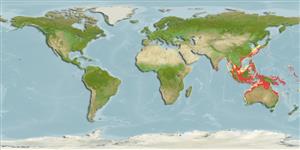Common names from other countries
Environment: milieu / climate zone / depth range / distribution range
Ecología
; rango de profundidad 0 - 90 m (Ref. 81020). Tropical
Distribución
Países | Áreas FAO | Ecosistemas | Ocurrencias, apariciones | Introducciones
Indo-West Pacific: China to Solomon Islands and Australia.
Length at first maturity / Tamaño / Peso / Age
Maturity: Lm ? range ? - ? cm
Shape varies from oval to conical. Spines are short and thin, with those nearer the oral surface being broad and flat. Color varies from white to olive green. Spines are green with reddish-brown, purple, white, or green brands.
Maximum spine length: 1.5 cm.
Life cycle and mating behavior
Madurez | Reproducción | Puesta | Huevos | Fecundidad | Larva
Members of the class Echinoidea are gonochoric. Fertilization is external. Brooding is common, eggs are held either on the peristome, around the periproct or deep into the concavities on the petaloids. Life cycle: Embryos develop into planktotrophic larvae (echinoplateus) and live for several months before they sink to the bottom using their tube feet to adhere on the ground where they metamorphose into young urchins.
Schoppe, S. 2000. (Ref. 800)
IUCN Red List Status (Ref. 130435: Version 2024-1)
CITES status (Ref. 108899)
Not Evaluated
Not Evaluated
Threat to humans
Harmless
Human uses
| FishSource |
Herramientas
Más información
Age/SizeCrecimientoLength-weightLength-lengthMorfologíaLarvaAbundancia
Fuentes de Internet
Estimates based on models
Preferred temperature
(Ref.
115969): 24.5 - 29, mean 28.1 (based on 1412 cells).
Price category
Unknown.
